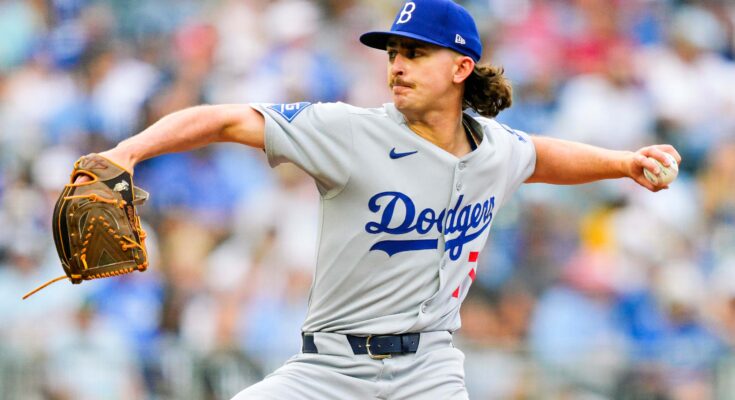Dodgers’ GM Andrew Friedman Admits Limited Activity at Trade Deadline, Explains Strategy Behind Minimal Moves and Long-Term Team Vision
As the 2025 Major League Baseball trade deadline passed, the Los Angeles Dodgers’ front office found itself at the center of discussion once again. Fans, analysts, and rival teams closely monitor the actions of Andrew Friedman, the Dodgers’ general manager, whose decisions—or lack thereof—often carry outsized influence on the team’s trajectory. This season, however, Friedman’s approach was notably restrained, leaving many observers surprised by the minimal activity at the deadline. In a candid interview, Friedman explained the reasoning behind the Dodgers’ strategy, offering insight into how elite teams balance present needs with long-term objectives.
Despite the quiet deadline, Friedman emphasized that the Dodgers were far from passive. “Sometimes, doing very little is actually a deliberate strategy,” Friedman explained. “We’re constantly evaluating the market, assessing our roster, and considering the broader implications of every move. It’s not about appearing active—it’s about making the right decisions for the team over the course of the season and beyond.” This honesty sheds light on the careful, measured approach that has defined Friedman’s tenure in Los Angeles.
The Dodgers entered the trade period with several internal factors influencing their decisions. Injuries, roster depth, and the performance of both veterans and younger players all played roles in determining whether acquisitions were necessary. Friedman acknowledged that, while other teams were aggressive in pursuing deals, the Dodgers had confidence in their existing talent to compete in the National League West. “We felt our core could handle the stretch run,” he said. “Adding pieces is important, but not if it comes at the expense of team chemistry or long-term flexibility.”
One key aspect of the Dodgers’ restraint was their emphasis on maintaining financial flexibility. In previous seasons, the team has demonstrated a willingness to invest heavily in talent, but Friedman suggested that careful resource management is equally critical. By avoiding impulsive trades or overcommitting to mid-season acquisitions, the Dodgers can preserve options for future seasons, including potential free-agent opportunities and long-term roster construction. Analysts note that this approach prioritizes sustainability over short-term hype.
Another factor behind the minimal moves was the Dodgers’ confidence in internal development. Young players and minor leaguers have shown promise, and the front office believes that providing these athletes opportunities can be just as impactful as trading for established stars. Friedman emphasized that development pathways are integral to the organization’s strategy. “We’ve invested heavily in player development,” he said. “Sometimes the best move is to let our own talent grow into the roles we need rather than constantly trading for external solutions.”
The trade deadline also coincided with a competitive landscape in the NL West, where the San Diego Padres and other rivals were making their own roster adjustments. Friedman noted that the Dodgers carefully monitored these moves but resisted the urge to react impulsively. “We’re always aware of what other teams are doing,” he said, “but our decisions are based on our roster and our goals, not just responding to market noise.” This measured approach reflects a long-term vision that emphasizes stability and strategic patience.
Fans, naturally, had strong opinions about the perceived inactivity. Social media buzzed with speculation about what the Dodgers “should have” done, ranging from blockbuster trades to minor tweaks. Friedman addressed these reactions directly, emphasizing that transparency and understanding are key. “We know fans want action, but it’s important to remember that moves aren’t inherently better just because they’re visible,” he explained. “Our goal is to position the team for both immediate success and sustained competitiveness.”
From a statistical perspective, the Dodgers’ minimal activity aligns with the metrics the organization tracks closely. Advanced analytics such as player WAR, on-base plus slugging, pitching efficiency, and bullpen performance inform every decision. Friedman highlighted that data-driven insights often guide the front office toward restraint, revealing that the team’s quiet deadline activity was not a sign of indecision, but a deliberate, informed strategy.
The timing of moves is another crucial element. By waiting until the right opportunity arises, the Dodgers maintain the ability to pivot if circumstances change. Friedman explained, “Being patient gives us leverage. We don’t have to make a deal just because the calendar says we should. Sometimes holding steady creates better options later.” This patience, coupled with a deep understanding of the roster’s strengths and weaknesses, exemplifies the modern approach to team management.
Internally, the Dodgers’ players have expressed support for the front office’s measured approach. Maintaining chemistry and confidence within the clubhouse is often as important as adding new talent. Friedman noted that the team’s culture plays a pivotal role in decision-making. “Our players trust the process,” he said. “They understand that the moves we make are designed to enhance the team as a whole, not just chase headlines.”
Looking ahead, Friedman hinted that the organization remains flexible. While the trade deadline has passed, the Dodgers are prepared to adjust if injuries or performance issues arise. The philosophy of deliberate, informed decision-making extends beyond July, reflecting a long-term vision that prioritizes sustained competitiveness. Analysts suggest that this approach could keep the Dodgers at the top of the division for years to come, even if fans sometimes wish for more visible activity in the short term.
Ultimately, Friedman’s candid reflections reveal a front office philosophy rooted in patience, strategic planning, and confidence in the organization’s internal resources. While the Dodgers’ trade deadline may have appeared quiet to outsiders, the reasoning behind doing very little demonstrates a sophisticated approach to team management. Balancing immediate competitiveness with long-term sustainability, Andrew Friedman continues to guide Los Angeles with a vision that goes beyond transactions, emphasizing both calculated restraint and careful planning as cornerstones of the franchise’s enduring success.



